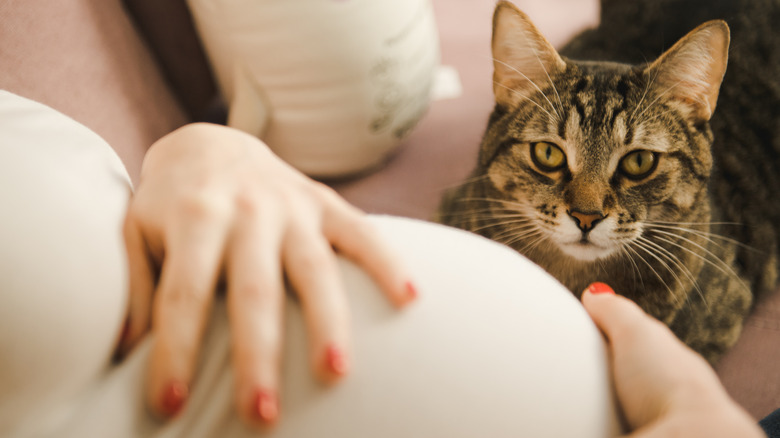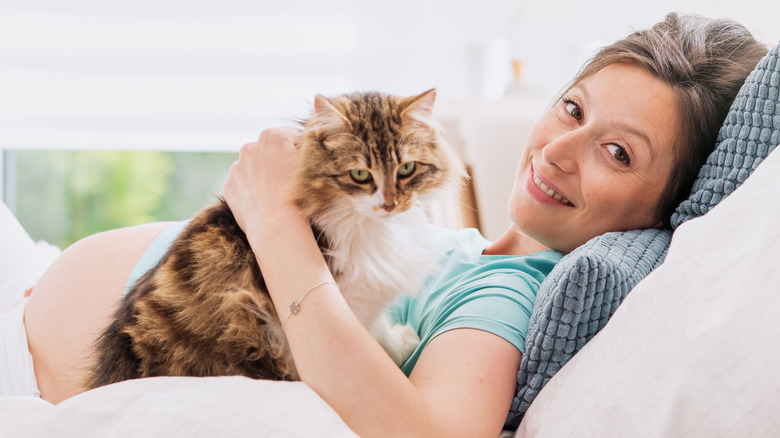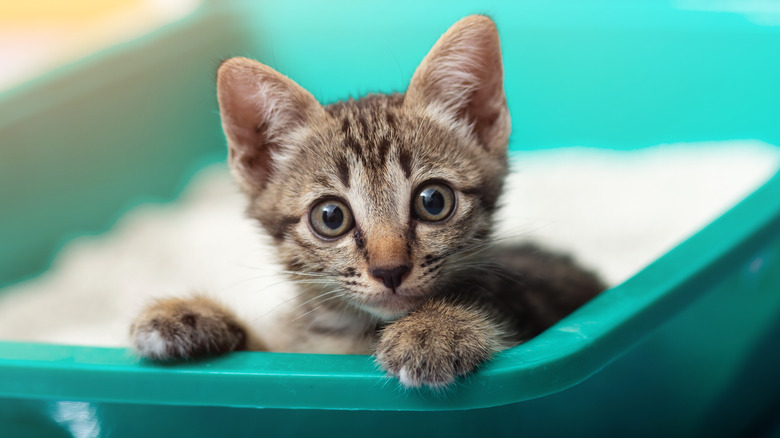Is It Safe To Have A Cat While Pregnant?
Gearing up to meet your little one is an exciting time. Preparing your baby's room, learning birthing breathing techniques, and gathering all the necessary supplies are part of the process. As you get ready for the arrival of your baby, you may be asking yourself, how will my current life mesh with my new life as a parent? Maybe your current life includes a beloved pet. Our fur babies are certainly members of the family, but do cats pose a potential health risk to mother and child during pregnancy?
Initially, this may sound contradictory. If our cats aren't eating or sleeping, they can likely be found cleaning themselves. According to Pamela Perry, an animal behavior resident at Cornell University's College of Veterinary Medicine, cats spend 50% of their time each day on self-cleaning (via Cornell University). How could an animal that spends half of its waking hours grooming possibly pose a health risk to humans? Unlike dogs, who often require regular bathing by their owners, cats sound like they're virtually spotless ... right?
Cats can carry a parasitic infection known as toxoplasmosis
Cats have the potential to transmit a parasitic infection known as toxoplasmosis to humans through contaminated fecal matter (via BabyCenter). If a pregnant woman becomes infected, it can lead to birth complications such as eye, brain, and organ damage, as well as potential health issues for the mother (via U.S. Centers for Disease Control and Prevention). While women can contract toxoplasmosis during pregnancy, an infection can also occur in the months leading up to conception. Some adults may experience flu-like symptoms, but newborn infants often do not exhibit any symptoms at all. Side effects can develop later in life.
It's important to note that outdoor cats are most at risk for becoming hosts to these parasites (via The Humane Society). This is due to the fact that outdoor cats are more likely to ingest rodents that carry the infection. Thankfully, the parasite generally makes its way through the feline digestive system within two weeks. In addition, the parasite requires 1-5 days to become infectious. If you are diligent about litter box cleaning, you can help prevent toxoplasmosis by disposing of the parasite. That being said, it's important to clean your cat's litter box properly.
Routine litter box cleaning can prevent the transmission of toxoplasmosis
Does all of this ultimately mean that soon-to-be parents need to get rid of their longtime furry companion? Maybe not. There are ways that new mothers can protect themselves and still keep Fluffy safely at home.
For a human to contract toxoplasmosis, the parasite must be transmitted by ingestion, according to BabyCenter. This includes hand-to-mouth contact, which is why handwashing is crucial when it comes to litter box cleaning. Experts at The Humane Society suggest keeping cats indoors during pregnancy and changing litter daily. In addition, utilize gloves when scooping, changing, and disposing of litter, and be sure to wash your hands with warm water and soap afterward. Even better, see if a friend or family member can take over litter box responsibilities for the time being to avoid direct contact with fecal matter altogether. If you are diligent with your cat's litter box maintenance, experts believe there is no reason you and your feline will need to part ways.



